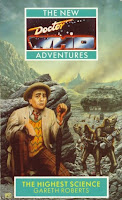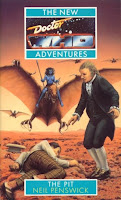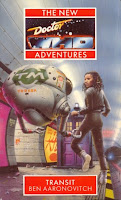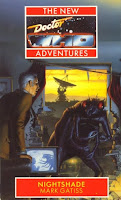Bloodheat

The TARDIS is attacked by an unknown force and Benny is ejected from the craft into the vortex. The Doctor and Ace lose the TARDIS in a tar pit, finding themselves on a parallel Earth where the last remnants of humanity have survived a deadly plague and are pitted in a desperate battle for survival against the resurrected Silurian race. It's an alternative reality, and not only has the war against the reptilian race turned Brigadier Lethbridge-Stewart into a hard and ruthless man, but it has claimed the Doctor as a casualty years ago.
Bloodheat begins a 5-novel cycle of alternate reality, and it starts it off with the extreme of actually going to a parallel Earth (which until the time it was published had only been done in Inferno but has since popped up as a theme in the 2006 season of the new series) and seeing the contrasts between what we consider as is and what could have been. Things all go wrong for humanity when the third Doctor is unable to escape the Silurian base and work on an antidote to their bacterial weapon, and in the days of the war that follows the Doctor is killed as a prisoner. UNIT is unable to stop the Silurians and Sea Devils as they emerge from hibernation and the Earth is overrun. When the seventh Doctor eventually crosses paths with the Brigadier and Liz Shaw, they are suspicious of him, never entirely trusting him to be who he says he is. And it's not just the Doctor who has to deal with the rejection of people he knows as friends; in this reality, Ace's friend Manisha has not been the victim of a racist attack on her home (as described in the novelization of Remembrance of the Daleks and more vividly in her soliloqy in Ghost Light) but the circumstances of their friendship are not the same this time.
Benny has the more interesting perspective when it comes to dealing with the Silurians, and when she is captured by them and used as an experimental subject they too notice it: she has no race fear of them. When pot-holing scientists from the Wenley Moor underground project first encountered the reptile species they were driven mad with fear and reduced to gibbering maniacs scribbling pictures on walls, but by Benny's day, the Silurians were an integrated species that shared the planet with humanity and contributed to its defence against the Daleks during one of their many wars. It doesn't exactly make her a sympathizer, but she does go out of her way to stop a nuke aimed at the Silurians' capital city in Africa.
And the Silurians despite everything that has happened are not portrayed as total monsters without an ethical code; they're doing what any of us would do if our homes were overrun by pests and exterminating the lot of them to make it liveable again. Granted, humans do rank a bit higher than cockroaches - or so one might hope - but the principle is the same. And there are those in the Silurian hierarchy who would once have seen humanity die out who tire of the war as well and realize that maybe there could have been another way.
Style-wise it's a good solid tale, it starts the alternate universe cycle off quite well. The Silurians had not been seen or heard from since Warriors of the Deep when this was published, and it was good to see them treated with a bit more respect. I don't have the time to go back and look at all of the stories of the alternate universe cycle, but if anyone reading wants to check them out they were, in this order: The Dimension Riders, The Left Handed Hummingbird, Conundrum and No Future.
But I am going to look at how the cycle ends, because it's kind of brilliant.
NEXT EPISODE : NO FUTURE
Labels: Ace, Bernice Summerfield, Brigadier Lethbridge Stewart, Liz Shaw, Sea Devils, Silurians, The 7th Doctor, UNIT








